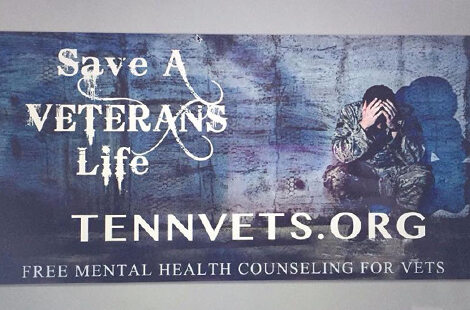Trevecca Ph.D. students find ways to help veterans get the care they need


When Dianne Bradley learned that 22 veterans commit suicide each day, she knew she had to do something to help.
That’s when Bradley, a licensed marriage and family therapist who teaches in Trevecca’s Graduate Counseling Program, launched TennVets, a Middle Tennessee nonprofit aimed at connecting veterans with mental health professionals. The counselors provide the services free of charge on an on-going basis.
First-year doctoral students in Trevecca’s Ph.D. Clinical Counseling program got involved with the organization last fall through a social justice project in Bradley’s Advanced Multicultural Counseling course.
Bradley’s students developed a campaign to raise statewide awareness about TennVets. The campaign included developing a social media presence for the nonprofit as well as securing advertising space on billboards, trolleys and buses in downtown Nashville.
“A little bit of research revealed that veteran suicides are not directly related to PTSD—post traumatic stress disorder—but more related to moral injury,” Bradley said. Moral injury refers to the damage to a person’s conscience or moral compass when that person perpetrates, witnesses or fails to prevent acts that transgress their own moral or ethical values.
“These are veterans,” Bradley continued. “They’ve served, they’ve seen, they’ve experienced horrific things. That’s the conflict that they carry with them internally, which sets them up for a lot of difficulty in merging with a society that hasn’t experienced that.”
Jonathon Roy, a Ph.D. student involved in the project, said much of the students’ work focused on education about moral injury.
“What makes TennVets special is that it focuses on moral injury,” Roy said. “So we did a lot of educating and explaining what that is. My specific part was to create a Facebook page for the organization. We started it 22 days before Veteran’s Day and did a post every day for 22 days focusing on ways to help veterans.”
A key part of the project, Bradley said, was that the students learned to rely on each other’s strengths. Each of the students had different roles. Roy focused on social media while other classmates turned their attention to marketing, connecting with local churches or counselors, research and more.
The project has garnered national and statewide attention.
“The American Association for Marriage and Family Therapy (AAMFT) posted about TennVets on the national site, and I’ve had communication with two other states who want to replicate the model. I’ve been in communication with a lobbyist in Washington, D.C., who wants to replicate it across the country,” Bradley said. “Operation Stand Down has shown interest as well as the Joshua Chamberlain Society.
“It’s hard to follow up on all the communication through the website,” Bradley continued. “Synergy is growing because of what these doctoral students did.”
For Roy, the experience was so much more than a class project.
“It was very eye-opening,” he said. “It’s very easy to read about social justice, and we hear a lot in the news about big social justice changes and think, ‘Oh, I could never do anything like that.’ This really made it applicable and helped me to see that anyone can help a population that doesn’t get a lot of attention and isn’t really thought of a lot. We can make a difference. We can advocate for our clients and be a positive force.”
Bradley said the project also required her students to challenge some of their preconceived notions of marginalized communities.
“Most of them didn’t think of veterans as fitting in the category of a marginalized population,” Bradley said of her students. “The last time we met, that was a big confession for several of the students. ‘I’ll never look at them the same again,’ the students said. Veterans were invisible people, and now they’re no longer invisible people.”
While the project may be over, Roy says that the project helped him to learn skills and tools he’ll use well into the future. More than that, it helped him to see how focusing on one population can have an incredible impact.
“There is endless need,” Roy said. “A lot of counselors, when we first start out, we want to save the world. But that’s not really possible. Who or what can I focus on? What can I give 110 percent to and make a difference? With that focus on one area, you can still do a lot of good.”
Learn more about TennVets at www.tennvets.org and follow the organization on Facebook.
Media contact: Mandy Crow, mmcrow@trevecca.edu, 615-248-1695
